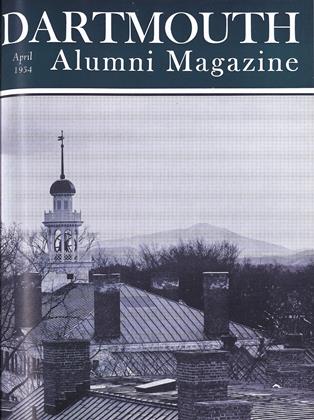By Edward Darling '29. New York: W. W.Norton, 1954. 255 pp. $3.00.
One of the phenomena of current American life is the sudden discovery that public education is front-page news - a cause of violent controversy, of hot tempers, of bitter hostilities and passionate loyalties.
Mr. Darling examines some of the sources and results of this phenomenon through the ingenious device of a "documentary novel." The schools of a well-to-do suburban town, "Oak Glen," have been subjected to organized attack by a small group of citizens who utilize all the devices now painfully familiar to such real American communities as Pasadena, California, Scarsdale, New York, and Englewood, New Jersey. Accusations, name-calling, dubious generalizations fly on all sides: Communist teaching, atheism, fads-and-frills, poor discipline, support of the United Nations, wasted tax-funds. Behind the scenes, the pseudo-fascist tactics of Allen Zoll, head of the sinister National Council for American Education, are easily discerned to be operating in "Oak Glen."
The hero of the novel, "Charles Daniels" (a graduate of Dartmouth, incidentally) is a young member of the school board. Though sometimes bewildered by the pros and cons of the dispute, he is eager from the first to support the experimental, progressive program of the schools and to defeat the attackers. The problem of the novel centers in how this can be accomplished.
"Daniels" is fortunate in belonging to a board which appears to be completely united at all times behind the liberal school superintendent, stands squarely up to the Zollites, and is able to squelch them without enlisting noticeable support from lower-status sections of the community. The chief strategy is twofold: organization of a citizens' group made up chiefly of upper-status citizens who are wellinformed and influential enough to outweigh the opposition, and the holding of a large public meeting in which the program of the schools is clearly explained and the motives of the enemy exposed.
The book was written in collaboration with members of the staff of the Center for Field Studies of the Harvard Graduate School of Education. Dartmouth alumni who have been wondering what the row is all about and how they might pitch in to defend education would benefit by Mr. Darling's very readable, though incomplete, diagnosis and prognosis of a public issue which threatens to become even more acute in the years immediately ahead.
 View Full Issue
View Full Issue
More From This Issue
-
 Feature
FeatureAn Introvert at Dartmouth
April 1954 -
 Feature
FeatureADMISSIONS—SCHOLARSHIPS—ENROLLMENT
April 1954 By Robert L. Allen '45 -
 Article
ArticleThaddeus Stevens, 1814
April 1954 By JOHN S. MONAGAN '33 -
 Class Notes
Class Notes1918
April 1954 By ERNEST H. EARLEY, RICHARD A. HOLTON -
 Class Notes
Class Notes1921
April 1954 By REGINALD B. MINER, WILLIAM H. PERRY -
 Class Notes
Class Notes1915
April 1954 By PHILIP K. MURDOCK, MARVIN L. FREDERICK







